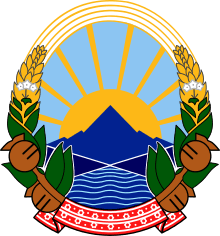Republic of Macedonia–Serbia relations
 |
|
Macedonia |
Serbia |
|---|---|
Macedonia–Serbia relations are foreign relations between Macedonia and Serbia.
Post-independence period
Until 1991, both countries were constituent republics within the Socialist Federal Republic of Yugoslavia. Following the declarations of independence of Croatia and Slovenia in June 1991, Macedonia declared its independence three months later in September 1991. The army of rump Yugoslavia peacefully left Macedonia, therefore Macedonia was the only former Yugoslav republic that gained independence without conflict or war. However, bilateral relations were not established immediately.
Establishment of bilateral relations
The Federal Republic of Yugoslavia was formed in 1992 by the remaining Yugoslav republics Montenegro and Serbia. It established diplomatic relations with the Republic of Macedonia on 8 April 1996.[1] The establishment of bilateral relations was conducted under Macedonia's constitutional name - Republic of Macedonia.[2] Serbia, therefore, is one of 131[3] countries in the world that recognize Macedonia under its constitutional name. Macedonia has an embassy in Serbia's capital city Belgrade, and Serbia likewise has an embassy in Macedonia's capital Skopje and an honorary consulate in the city of Bitola.
Break and reestablishment of bilateral relations
Following the establishment of bilateral relations, both countries maintained friendly relations, but following Macedonia's recognition of Kosovo's independence in October 2008, the Macedonian ambassador was expelled from Serbia.[4] The break in relation lasted a few months. However, Serbia and Macedonia agreed to reestablish bilateral relations. The new ambassador of Macedonia took office in Serbia in May 2009. The new Macedonian ambassador to Serbia is the former speaker of parliament and former ambassador to Bulgaria, Ljubisa Georgievski.[5]
Church row
A church row has burdened the relations in the past. The Serbian Orthodox Church does not recognize the Macedonian Orthodox Church, which declared autocephaly from the Serbian church in 1967. On a visit to Macedonia in May 2009, the President of Serbia, Boris Tadić, pointed out that his country wishes a settlement to that issue.[6] The Serbian Orthodox Church in the past blocked the visit of Macedonian state delegations to the Prohor Pčinjski Monastery in southern Serbia on the Macedonian Day of the Republic, the place where the foundations of Macedonian statehood were laid during World War II at the first plenary session of ASNOM. In 2009, however, the Serbian Orthodox Church surprisingly allowed a visit by a Macedonian Parliament delegation.[7]
See also
References
- ↑ Ministry of Foreign Affairs - Republic of Macedonia
- ↑ Republic of Serbia - Ministry of Foreign Affairs
- ↑ Bolivia is 131. country to use Macedonia's constitutional name Ekonom:east Media Group. 20-01-2011
- ↑ "Serbia Expels Macedonian, Montenegrin Envoys Over Kosovo". DW.COM. Retrieved 2 May 2016.
- ↑ "My Info Agent". Retrieved 2 May 2016.
- ↑ "My Info Agent". Retrieved 2 May 2016.
- ↑ "My Info Agent". Retrieved 2 May 2016.

